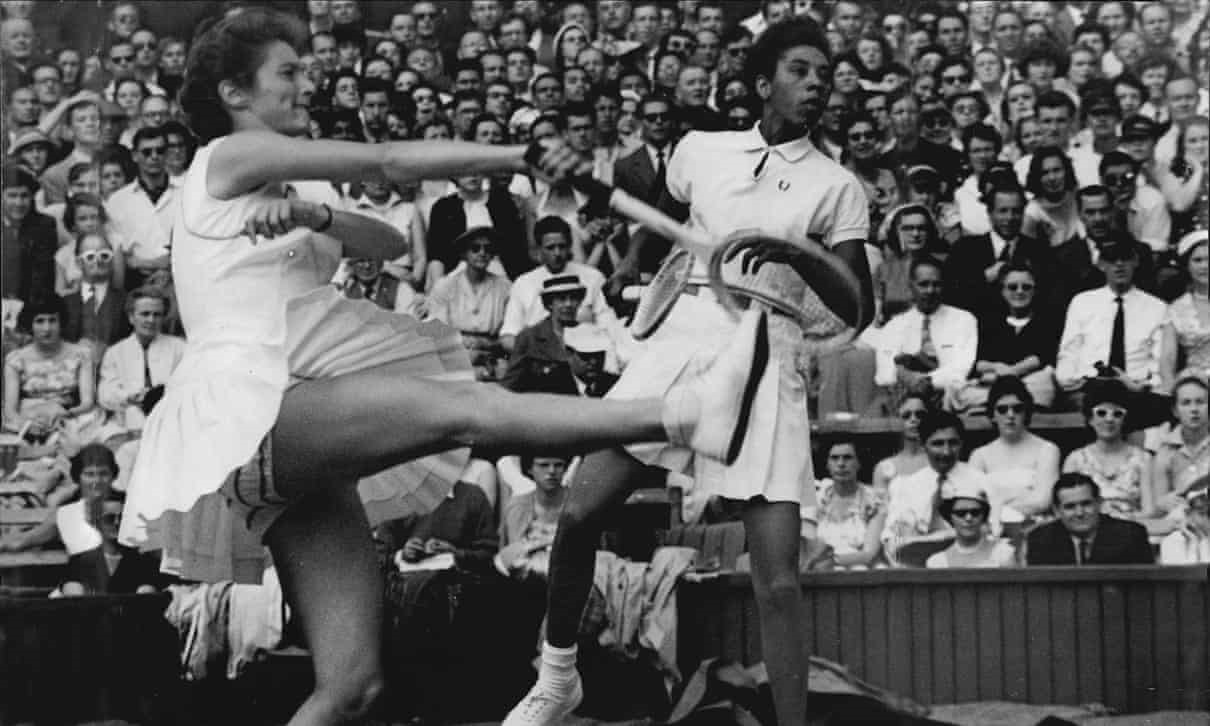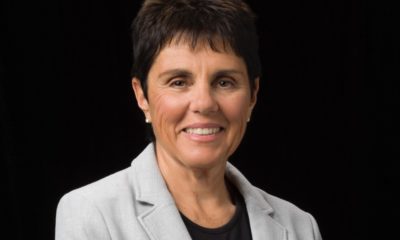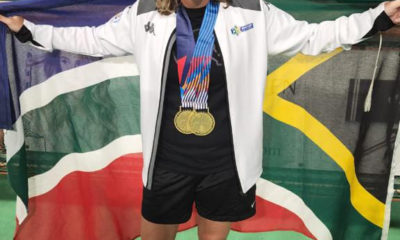
Featured Item

The tennis champion impacted by antisemitism
Published
4 years agoon
When tennis champion Angela Buxton died last week at the age of 85, she was lauded as a “pioneer against prejudice” on and off the court. After spending much of her childhood in South Africa, she succeeded on the international tennis circuit in spite of facing blatant antisemitism every step of the way.
Buxton became the first British woman in 17 years to reach the ladies’ singles final at Wimbledon in 1956, losing to American Shirley Fry. She also won the women’s doubles title at both the French Championships and Wimbledon in the same year with doubles partner Althea Gibson.
The two women’s names are bound up with each other. They were each “half of an outcast duo… outsiders in the starched white world of elite 1950s tennis, superb players but excluded from tournaments and clubs and shunned on the circuit because of their heritage”, according to the New York Times’ obituary on Buxton’s death.
“Anyone who wins a title at Wimbledon automatically becomes a member of the All England Lawn Tennis and Croquet Club [the formal name for Wimbledon]. Until their dying days, both Angela and Althea were never made members because of antisemitism and racism,” says Marlene Bethlehem, who represented South Africa at Wimbledon in the 1960s and won the Ladies Singles Plate event there in 1962.
Following her Wimbledon victory, Buxton applied for admission to the club, believing she would be admitted as one of England’s top tennis players. However, her application, along with Gibson’s, was never accepted. Over the next 63 years, Buxton continued to apply for admission without success. In 2004, she said, “I think the antisemitism is still there. The mere fact that I’m not a member is a full sentence that speaks for itself.”
She later told The Observer, “The antisemitism made me more isolated. It made me more determined, more detached. As a result, I was often on my own. For a different reason, Althea was on her own too. And then we came together and beat everybody.”
Buxton was the daughter of Violet and Harry Buxton, who owned a chain of cinemas in England. When World War II began, her father sent her, her mother, and brother to South Africa for their safety. Buxton was six years old at the time.
In an article in the Times of Israel (2014), Buxton fondly recalled her seven years in various cities in South Africa, including Johannesburg and Cape Town. Described by many as a bright and eternally feisty individual, Buxton delighted in looking back at her days here, saying she had attended a convent school with other Jewish children, and was taught by nuns. It was in South Africa that she began to develop her tennis skills and was recognised for her talent.
She told the Times of Israel that it was also in South Africa that she first experience racism. Friends and neighbours were disapproving of the friendship she had with the daughter of the neighbour’s domestic worker, with whom she “played hopscotch and similar games”, telling her she shouldn’t mix with black people. However, Buxton said, “My mom was no-nonsense when we came across it.”
In a similar incident, the Buxton family was approached by a young black woman looking for some cleaning work, she told the publication. Several days later, she appeared with her six-month-old daughter, desperately seeking a place to stay.
“We offered her a job and a place to sleep – on the stoep of our flat” until the landlord threatened to evict them. In spite of her mother’s acceptance, she was also pragmatic and said, “We are guests of the country. We need to keep our heads down, and noses clean.”
“This incident stayed in my mind until I met Althea,” said Buxton.
It was in South Africa that she also first felt the brunt of antisemitism, according to the Times of Israel.
Her mother, Violet, was arranging her hair in the common bathroom shared by several flats. When a man asked if she was finished yet, he then remarked, “You Jews are all the same. You think you own the world!” Violet took her comb and hit him. “Twice,” recalls Buxton.
Buxton reflected on the reason for the man’s comment, and suggested, “There was no good reason – the war was on, and Jews were being sent to the slaughter.”
Returning to England in 1946, her parents got divorced, and she was sent to a boarding school in Wales where her coach immediately saw her talent and developed it through local competitions.
“I was head and shoulders above the rest. During the war, they had no rackets, no balls, and no nets in England. I was beating girls of 18!” Her success in tennis caught the attention of various coaches including George Mulligan from Liverpool, who said of Buxton, “This is a potential Wimbledon champion!”
Buxton was later coached by Ben Tilden in the United States, an ex-Wimbledon champion with whom she played mixed doubles.
Both Bethlehem and Buxton ended their tennis careers at the age of 22, Bethlehem because she got married, and Buxton because of an injury. But before that, when they were both stars at Wimbledon, Buxton invited Bethlehem over for Shabbat dinner.
“We met up during my second year at Wimbledon. Angela knew I was Jewish, and invited me for Shabbos dinner. Her husband was Donald Silk, a solicitor and the chairperson of the Zionist Federation of Great Britain and Ireland. Her parents were Russian, and she told me that when she was in South Africa, neighbours laid a complaint about her playing tennis with black kids.”
The antisemitism Buxton repeatedly experienced deeply informed her worldview, and led her to team up with Gibson.
“When she and her mother went back to live in England, she tried to join the Cumberland Club. They told her, ‘You’re good enough to play here, but we don’t take Jews.’ It was very open,” says Bethlehem. “She eventually went back there, determined to win the tournament, which she did, twice. She said when she won, they didn’t even give her a cup of tea.”
Buxton was repeatedly refused access to training facilities because of her ethnicity. From the mid-1950s, she was able to practise at the private indoor court of Simon Marks, the Jewish owner of department store chain Marks & Spencer, who was aware of the antisemitism she faced.
Bethlehem recalls when Buxton and Gibson first crossed paths. “Angela was on tour with a group in India in 1955 when she noticed Gibson. She was the only black girl, and was on her own a lot, so Angela befriended her. Then the coach said that Althea was having difficulty finding a doubles partner. Angela decided to join her.”
The rest is history. “A couple of weeks later, they won the French championship and Wimbledon. They became extremely famous,” says Bethlehem. “But many years later, Angela got a call from Althea saying that she was in a care home in New York and was struggling financially. Angela put a notice in Tennis Week magazine calling for support, and after a while, the money poured in. She raised nearly a million dollars, and Althea was able to live the rest of her life in comfort and security. Their lives were definitely tied to each other.”
Bethlehem and Buxton exchanged Rosh Hashanah greetings every year. Buxton went on to coach tennis and basketball, and faced challenges in her personal life, including divorce from Silk, and the deaths of two sons. She wrote tennis coaching books and founded the Angela Buxton Tennis Centre. She died two days before her 86th birthday. “Being Jewish was very important to her. And I think her years spent in South Africa also influenced her life,” says Bethlehem.
Buxton was inducted to the Jewish Sports Hall of Fame in 1981. Sandra Harwitt, an international sportswriter who has covered more than 70 Grand Slam tennis events, includes a chapter about Buxton in her book, The Greatest Jewish Tennis Players of All Time: “Angela lived in a time when women didn’t have a significant voice, yet Angela never held back from offering thoughts and opinions on everything, and pushing for her rights. She always speaks her minds and has opinions,” Harwitt wrote.










